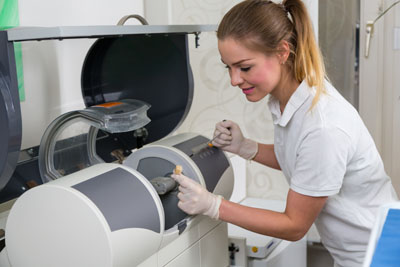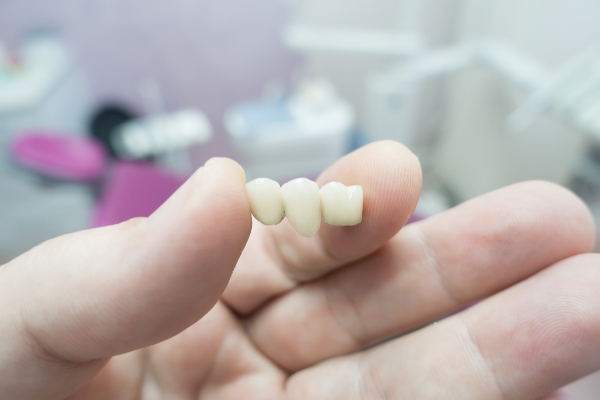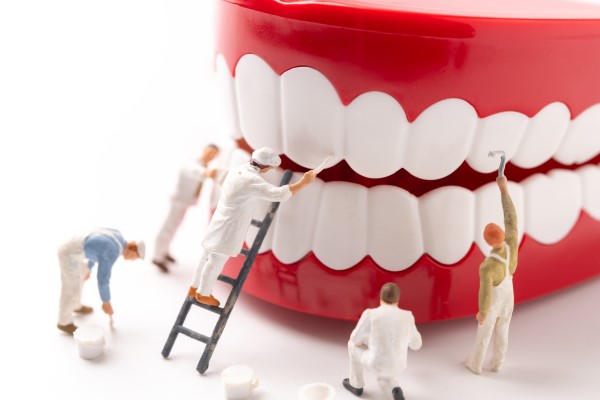How to Care for Implant Crowns

Dental implant crowns are artificial teeth that are screwed to the top of the titanium posts that are fused to the jaw to hold the teeth in place. The implants have become a popular way to replace one or more missing teeth because they are visually indistinguishable from natural teeth. Since the implant crowns are usually made from porcelain and cannot decay, most people assume they do not require as much attention as their natural teeth, which is not the case.
Taking care of dental implant crowns
Cleaning implant crowns is similar to the way people clean their natural teeth. However, since the crowns are artificial, there are a few things to keep in mind. Bacteria and food particles can get stuck in the areas around the implant, which can lead to the formation of plaque. This can lead to infection or gum disease if left untreated.
To ensure that the patient's artificial teeth are as clean as possible, dentists recommend using the following tools to help take care of the implant crowns:
Interproximal brushes
Even though regular toothbrushes do a good job removing biofilm from the surface of the teeth, dentists recommend using interproximal brushes to clean the implant crowns because they can reach parts of the teeth that regular toothbrushes cannot. This helps to prevent the buildup of plaque under the artificial tooth. Electric toothbrushes are also fine to use because they do a better job cleaning the teeth than regular toothbrushes and have smaller heads, which allow them to clean the implant crowns better than a regular toothbrush can.
Non-abrasive toothpaste
Most people do not pay attention to the type of toothpaste they use to clean their teeth because the type of toothpaste they use gets the job done. However, dentists suggest the use of non-abrasive toothpaste for people with dental implants because it is gentler on the surface of the artificial tooth than regular toothpaste.
Oral irrigators
Oral irrigators or water flossers help to reduce plaque buildup and inflammation because they can be used to flush out the plaque and debris that get stuck under the implant crowns. Dentists recommend using a water flosser with a non-metal tip to clean the underneath of the implants at least twice a week.
Protective appliances
A dentist will recommend a mouthguard or retainer to their patients if the patients grind or clench their teeth while they sleep. The retainer or mouthguard protects the implant crown from damage caused by wearing from involuntary teeth grinding during sleep.
Regular professional cleaning
The best way to keep a dental implant crown clean is by having the dentist clean the implant regularly. The dentist will thoroughly clean the threads of the implant, the surrounding gum tissue and the patient’s natural teeth, keeping away bacteria that can lead to infection.
Conclusion
Cleaning your dental implant crowns is important because it helps maintain the health and longevity of the implant. If you have implants and want to learn more ways you can properly take care of them, schedule an appointment with your dentist to get more information.
Request an appointment here: https://brimhalldentalgroup.com or call Brimhall Dental Group at (661) 249-1122 for an appointment in our Bakersfield office.
Check out what others are saying about our services on Yelp: Read our Yelp reviews.
Recent Posts
Curious about dental bridges? Read on to learn more about this type of restoration. The aftermath of tooth loss can be a struggle. The loss puts extra pressure on the rest of the teeth and chewing becomes less effective. Your speech gets affected too. Fortunately, dental bridges lay out a path to restoring the look…
A denture repair should be your top priority when your denture breaks or becomes damaged. This prosthetic device fills out all the empty spaces in your mouth. It is crucial to care for your denture since the missing teeth can compromise your eating habits, speech, and appearance. This dental device is durable enough to handle…
Missing teeth can negatively impact your smile's appearance and health. However, there are treatments out there that can help. Dental bridges are a common dental restoration that can improve oral health and enhance your smile. A dental bridge can be an effective solution if you have lost a tooth due to decay, injury, or other…
A dental bridge is not a permanent restoration despite the changes that the neighboring natural teeth will go through for the treatment. However, there are different types available, each one capable of meeting your dental needs. Your dentist can present both permanent and removable options. Here are the details on the impermanence of a dental…


